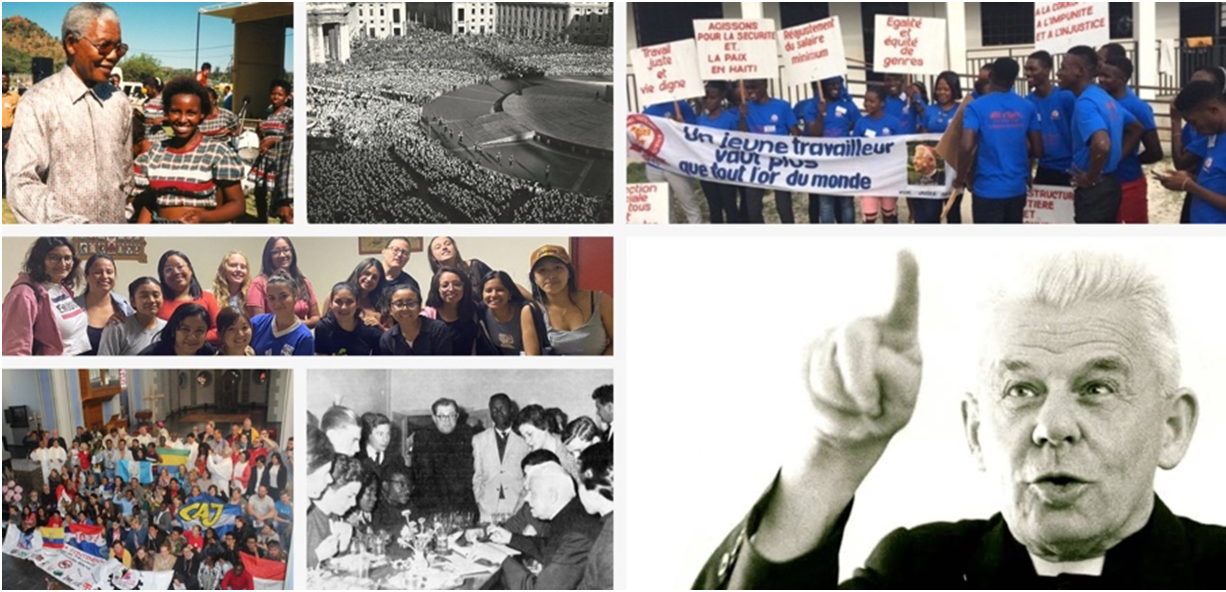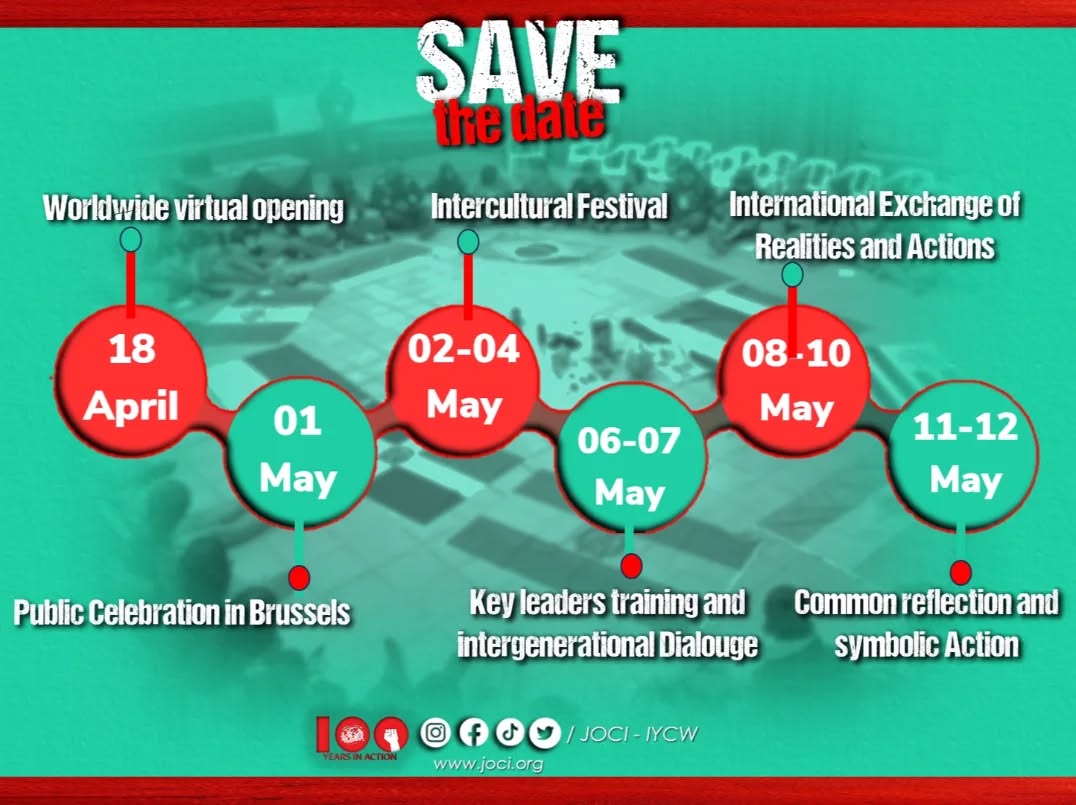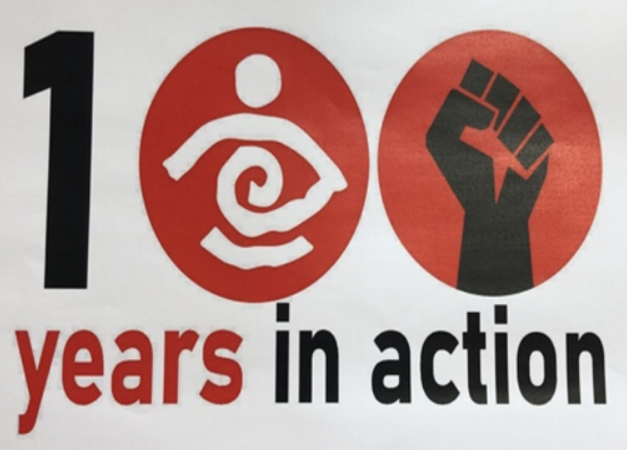
In 2025, the YCW will celebrate its 100 years of existence. Although Cardijn created the first base group in 1912, 1925 was the year of the official registration of the men and women’s Francophone and Flemish Belgian YCW movement. It was also the year of recognition by both the local Church and the universal Church in the person of Pope Pius XI, who listened and responded to Cardijn's hope to "save young workers."
From that moment on, the YCW spread rapidly from Europe to the whole world, in a remarkable way, to organize young workers and fight for their dignity and future.
As a popular education movement, the YCW incessantly seeks to strengthen the leadership potential of all young men and women workers worldwide by developing actions at local, national and international levels. The internationally recognized SEE-JUDGE-ACT method is the legacy of its founder and goes hand in hand with the movement's pedagogy and philosophy, which encourage young people to be relentless agents of change and universal citizens. The YCW remains faithful to its fundamental mission and political option of organizing and raising awareness among young workers about their own realities and the root causes of the problems and challenges they face around the world.
Over those 100 years of existence and action, the movement has been composed and coordinated by young people at all levels - the definition of an ever-young movement!
Indeed, the YCW is not only an organization of young people, but also an organization for young people. Since its creation, it has striven not only to improve the living conditions of young workers, but also to represent young workers and young people in general.
It has given a voice to the most vulnerable sectors of the communities in the different countries, not just a voice but a safe space to organize and hope for a better future, which of course comes with an action that is renewed time and time again and remains a permanent need!
A movement that contributes to the good development of society
Many of the actions launched or organized by young people in the movement contribute to the good development of society. From the very beginning of the international movement, "on 5 June 1935, 100 YCW delegates, including unemployed, gathered at the Geneva headquarters of the ILO where they submitted a petition signed by 86,000 young workers. The petition put forward several proposals for lowering unemployment rates such as establishing major work projects, extending schooling and reducing working hours without lowering salaries, etc. For the YCW it was the first taste of battle at the international level defending the interests of millions of young workers whose health and dignity were in danger.”1
No matter when! Whether during the Second World War, in Europe or on other continents, or during the dictatorship in Latin America or Asia, or even during apartheid in Africa, many YCW leaders fought on the front lines of resistance against oppression, or in global solidarity groups. The names of many of them are etched on the walls of history. Along the same line, many others continue their struggles to this day, because the YCW is a school of life for them.
The movement has always been organizing domestic workers and is also responsible for founding many of the associations and trade unions that represent them. More recently, the movement was at the forefront of the fight for the adoption of a landmark International Labour Organization Convention for domestic workers that confirmed their labour rights. Ten years on, the movement continues to defend the implementation of those rules and principles at national level.
Indeed, the intensive participation of YCW leaders and members in various bodies and platforms gives young workers the chance to be involved, included, listened to and heard in decision-making bodies such as the ILO, UNESCO, the UN and many others.
Through these actions and this process, the YCW has helped to train leaders who have assumed and continue to assume strong responsibilities within various structures, governments, local, national or international trade unions, sectoral bodies, NGOs and social movements. All have a unique sense of justice, and all have remained true to their commitment to workers, in many cases until the end of their lives.
A movement that never stopped moving forward
But most importantly, from the beginning to today, the movement has never stopped moving forward thanks to young workers at the grassroots. Together with the most vulnerable people and populations, young workers, individually and collectively, keep fighting in the most relevant social sectors of society.
In Brazil, Egypt, Haiti, Peru, Venezuela and Indonesia, the movement organizes young men and women in the social and solidarity economy, producing food, embroidering bags, mining salt, making ceramics, and organizing literacy and computer courses for young people to combat unemployment and informality and enable these young men and women to earn an income and support themselves and their families in the context of the economic crisis affecting the whole population today.
In Germany and Spain, the YCW organizes young women and the LGBTQA+ community and fights for equal opportunities and equity for all. In Ghana, Sri Lanka and Pakistan, organizing young women is a priority.
In Indonesia, the Philippines and Nicaragua, the movement organizes workers in garment factories and free trade zones demanding fair wages, access to social protection, better working conditions and gender equality.
In Australia, Flanders and Japan, it organizes young migrants through language courses, scholarships and training centres, as well as the creation of spaces free from discrimination and racism.
In Chile, the YCW members focus on the environmental crisis and create solutions to help save Mother Earth.
In the Wallonia YCW, young leaders develop actions to combat racism and police oppression, among other things which are the current struggles of today's society.
No matter where! In the different countries, young people are facing enormous challenges in their daily lives, but they are still motivated and taking action to change their realities and form leaders for the challenges of today and tomorrow which will need activists who are committed to giving their time and focusing on creating solutions. These are just a few examples of where the movement exists and where young leaders are trying to do something to change their reality.
Testimonies from former YCW members
“My commitment today is still based on these values. We still have the privilege of defending those who are in trouble. We are doing this in particular in the context of the fight against growing poverty and exclusion. I am doing so today on a voluntary basis, in the social housing sector, rehabilitation centres, welfare sectors, with refugees, in the 11.11.11 campaign, through world solidarity, etc ». Guy TORDEUR – Belgium
“A large number of YCW activists and fulltime leaders have held positions of responsibility in the worker movement organizations, whether in the trade union, the MOC itself, Equipes populaires, Vie Féminine, but also in other associations.” Marina MIRKES – Belgium
Testimony from a young leader of today
"It's been 5 years since I joined the YCW, and I've learnt a lot through our ROLWA. The YCW has enabled me to take life more seriously, to see reality from a different point of view, to think before I act and to understand that I have a role to play in this country, even if it doesn't look like it today. I also learnt solidarity and openness to others.” Neama Moussa- Egypt
The testimonies and the various actions and activities carried out at different levels of our movements show that, to this day, the YCW continues to have an impact on the lives of young workers, that it helps to shape their personalities and change their reality and future, that they become actors of change in their lives and not mere observers.
This is why the celebration of the 100 years of existence of the YCW movement is crucial, not only to celebrate the past and our legacy, but also to underline our exceptional continuity as an international movement that has survived wars, pandemics, political and economic crises at all levels throughout the years.
We celebrate the fact that the YCW is still a movement led by, for and with young workers!
1 IYCW 75 years in Action




 English
English  Español
Español  Français
Français